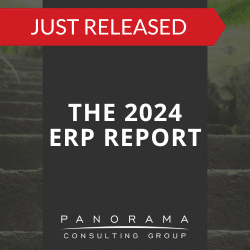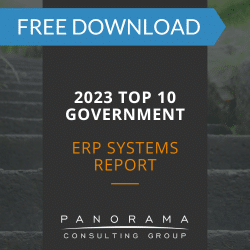Project managers play a key role in the success of ERP implementations. Successful project managers will guide the project toward the right checkpoints, ensuring that everyone has access to the resources they need.
However, an inexperienced project manager might make a few missteps along the way. When this happens, it could derail the project and even cause complete project failure.
Today, we’re sharing eight of the most common project management mistakes that can lead to ERP failure.
8 Project Management Mistakes
1. Pressing Ahead Without a Strategy
Before investing in a new ERP system, project managers must ensure strategic alignment when it comes to short- and long-term organizational goals.
With clear project goals, an organization can take an honest look at current processes and decide which workflows could benefit from the automation that ERP platforms provide. The organization can also identify which processes need to be reengineered.
A strong project manager knows that this alignment is critical, and they don’t rush the ERP selection phase.
Contemplating litigation?
We have multiple software expert witnesses available for provision of reports, depositions, and testimonies.
2. Failing to Actively Participate
One of the most common ERP project management mistakes has to do with engagement.
This isn’t a hands-off position that someone can handle from afar. A project manager should be actively involved in every step of the project plan.
A few of their core duties include:
• Assigning roles and responsibilities
• Managing the budget and timeline
• Keeping teams on task
• Answering questions and delegating activities
It sometimes makes sense for the project manager to manage a project like a CEO would handle their own company. When visualized this way, it becomes evident how important the effort is and what’s at stake.
3. Rushing the Timeline
We live in a fast-paced digital world where everyone wants everything done yesterday. Yet, you simply can’t rush an ERP implementation.
One of our prospective clients wanted to skip the requirements gathering phase. This rushed approach would mean they would be selecting a vendor without providing any clear software requirements.
A lack of requirements is especially a problem when a software solution is inflexible. The implemented solution might not meet all of the company’s needs, and there wouldn’t be much the company could do about it.
This is just one example of how a rushed timeline can lead to project failure.
That said, there’s no reason to unnecessarily expand the project scope. Spending more time focusing on best practices, like requirements gathering, is different than allowing a requirements gathering “free for all” where you incorporate any requirement that end-users suggest at any point in the project.
4. Not Assessing the Market
It’s easy for project managers to get caught up in their internal office environments. This is especially the case when they’re working on something as transformative as an ERP software implementation.
However, they should also take the time to stay current. This means researching innovations, like AI in ERP, and understanding use cases for their industry. This is critical to understanding how the ERP investment fits into the company’s bigger picture.
5. Skipping Organizational Change Management
One of the biggest ERP implementation mistakes that a project manager can make is to skip or rush organizational change management (OCM).
From an employee’s perspective, the thought of adopting a new ERP system is overwhelming. With OCM, project managers can put steps in place to curb this anxiety, answer questions, and address concerns.
6. Being Unorganized and Unstructured
If a project manager slacks off, everyone will feel it. Meetings will run long, and they won’t stay on topic. Deadlines will get missed and assignments will overlap.
A strong project manager knows how to keep everything and everyone in order, and that starts with themselves.
7. Transferring Bad Data
An ERP system is only as robust as the data that powers it. If a project manager allows bad data to move into the new system, the software will be limited in its ability to enhance operational visibility and improve decision-making.
To prevent this, project managers should establish a data migration plan that ensures data integrity.
8. Stopping After Go-Live
A project manager’s work doesn’t end when the project successfully reaches that coveted go-live date. They need to continually measure benefits realization and conduct a slew of other post-implementation activities.
For example, they must implement a maintenance strategy to upkeep and improve the system on a regular basis.
Otherwise, the software could become outdated or even obsolete.
How Effective is Your Project Manager?
While these are eight of the most common project management mistakes, they aren’t the only pitfalls to avoid. There are many other ERP failure reasons to be aware of.
By avoiding these mistakes, your project manager can lead your team members toward a successful digital transformation.
Along the way, our ERP consultants can audit your project and perform project recovery if necessary. Contact us below for a free ERP consultation.















